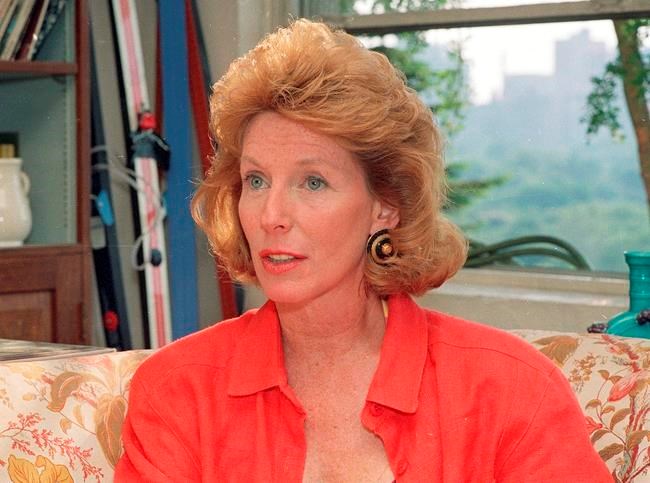NEW YORK — Gail Sheehy, the journalist, commentator and pop sociologist whose
Sheehy, widow of New York magazine founder Clay Felker, died Monday of complications from pneumonia in Southampton, New York, according to her daughter, Maura Sheehy.
“Passages: Predictable Crises of Adult Life” was published in 1976 and immediately caught on with a generation torn by the cultural revolution of the time, sorting through mid-life struggles, marital problems, changing gender roles and questions about identity. As Sheehy noted in the book’s foreword, close studies of childhood and old age were widely available, but far less scrutiny had been given to the prime years of work and relationships.
“It occurred to me that what Gesell and Spock did for children hadn’t been done for us adults,” Sheehy wrote. “It’s far easier to study adolescents and aging people. Both groups are in institutions (schools or rest homes) where they make captive subjects. The rest of us are out there in the mainstream of a spinning and distracted society, trying to make some sense of our one and only voyage through its ambiguities.”
Drawing upon more than 100 interviews, Sheehy combined research and personal stories to probe why some marriages lasted and others ended, why some left unsatisfying jobs while others stayed, why some were able to reconcile with growing older while others never developed beyond their early years. Part of the book’s appeal was its hopeful message, as suggested by the subtitle: There’s a consistent and manageable pattern to adulthood; it’s ok not to be young anymore; if you’re willing to take chances, there are richer, more meaningful ways to find happiness later in life.
“The greatest surprise of all was to find that in every group studied, whether men or women, the most satisfying stages in their lives were the later ones,” she wrote. “Simply, older is better.”
“Passages” helped set off a conversation that lasted for decades. The New York Times praised Sheehy for her “pertinent and persuasive” objections and a 1991 survey conducted for the Library of Congress and the Book-of-the-Month Club ranked “Passages” among the books that most influenced people’s lives.
But Sheehy was criticized for overgeneralizing, for focusing too closely on affluent professionals and for such glib expressions as “Trying Twenties.” She also was sued for plagiarism. Los Angeles psychiatrist Roger Gould alleged that Sheehy made extensive use of his research without giving him credit. The case was settled out of court.
Sheehy herself acknowledged shortcomings, notably that there was much to say about life after age 50. She would continue with “The Silent Passage” (menopause), “New Passages” (life after 50), “Understanding Men’s Passages (a midlife resource for men) and “Passages in Caregiving” (caring for family members). Sheehy told her own story in the 2014 memoir “Daring: My Passages.”
When not writing books, Sheehy was a popular lecturer and television commentator and a well-
Sheehy’s
Born Gail Henion in Mamaroneck, New York, the daughter of an advertising man and beauty consultant, she had been a storyteller since childhood. She was an undergraduate at the University of Vermont and a journalism major at Columbia University, where she found a mentor in the anthropologist Margaret Mead. After school, she married medical student Albert Francis Sheehy (they divorced in 1968) and had a daughter, Maura. (Sheehy and Felker later adopted a girl, Momh).
Sheehy’s journalism career began at the Rochester Democrat & Chronicle and the New York Herald Tribune, her colleagues including Tom Wolfe, before joining New York in 1968. Felker, the volatile and visionary publisher, became her mentor and lover. They dated off and on for more than a decade before marrying in 1984. Felker, who died in 2008, was the “love of her life,” she would later write. She credited their bond in part to lessons she had absorbed from “Passages.” She had been willing to leave him, if only to prove she could manage alone.
“If I had stayed with Clay and failed, we would have lost each other forever,” she recalled in her memoir.
Her early books included the novel “Lovesounds” and the nonfiction “Hustling,” an expansion of her magazine reporting about prostitution and the basis for a TV movie starring Lee Remick and Jill Clayburgh. Tragedy compelled her to write “Passages.” She was working on a story in Northern Ireland in the early 1970s, talking to a young boy, when a bullet “blew his face off.” Many bullets followed, one nearly hitting Sheehy, on what became known as Bloody Sunday.
Back home, Sheehy was deeply traumatized, her temper raging, her private life in turmoil. She began thinking for the first time about time, the “arithmetic of life.”
“In normal circumstances, without the blow of a life accident, these issues affiliated with midlife are revealed over a period of years. We have time to adjust. But when they are thrust on us all at once, we cannot immediately accept them. The downside of life comes too hard and fast to incorporate,” she wrote for the 2006 edition of “Passages.”
“In my case, the unanticipated brush with death in Ireland brought the underlying issues of midlife forward in full force.”
Hillel Italie, The Associated Press




